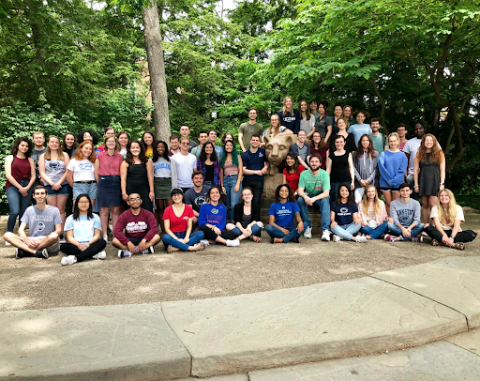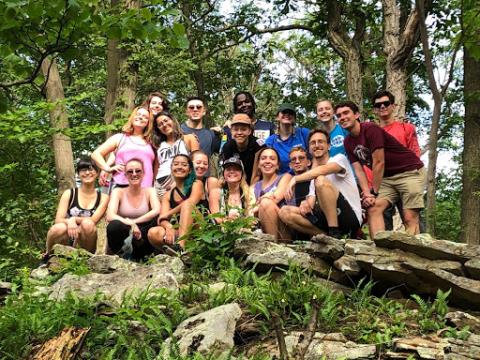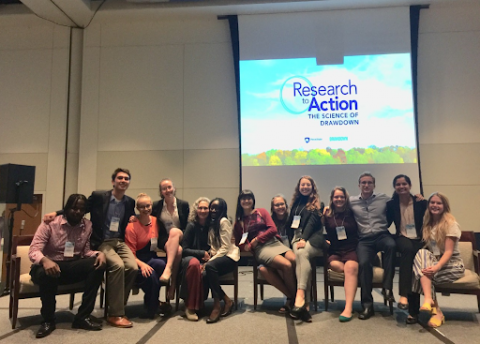During the summer of 2019, we had the opportunity to participate in the inaugural Drawdown Research Experience for Undergraduates (REU) along with fifty other undergraduates from across the country. The Drawdown Scholars REU is a summer-long program hosted jointly by Penn State and Project Drowdown in which undergraduates from universities across the country come to Penn State to conduct research relevant to Project Drawdown’s plan to reverse global warming. Two years and a world-altering pandemic later, this experience continues to shape our daily lives, work, and our perspectives on the climate crisis.
Project Drawdown is a global research organization working to reverse global warming by researching and modeling feasible climate solutions. The Penn State Drawdown Scholars REU program provided a diverse and interdisciplinary opportunity for undergraduates to learn about and actively contribute to climate solutions. Each research project was unique—spanning from atmospheric modeling to studying the influence of gender on agricultural emissions to college curriculum development. These projects resulted in meaningful contributions to the body of knowledge of how our society can most effectively and equitably address the climate crisis.

All of the students applied, at least in part, out of a common desire to work to address climate change, one of the largest issues our society faces. There are very few opportunities, especially for undergraduates, to do research based work that has a direct impact on a pressing issue. The sheer number of applications received and the enthusiasm brought by everyone involved speaks to a huge unmet demand for these opportunities. Students are seeking opportunities to strengthen their technical and communication skills and become the next generation of climate leaders. The Penn State Drawdown REU program was unique because it provided a meaningful research experience for undergraduates and it was broadly accessible. The opportunity was open to all majors and participants received a meal plan, housing, and a stipend, made possible in part by a NSF grant, which allowed for participation regardless of socio-economic status.
Through participation in the program, we were able to join a community of students, scientists, professionals, and local government officials collaborating on innovative solutions to address climate change. The research program provided opportunities to build our knowledge, engage with complex research methodologies, and broaden our understanding of the diversity of disciplines that can contribute to climate solutions. Most importantly, the program provided us with the resources and support to develop climate leadership skills. The community’s collaborative atmosphere allowed us to foster innovation and push the bounds of what climate action can and must look like.
Students took creative and academic ownership of their research projects. The projects led to deliverables such as statistical models to evaluate the effectiveness of climate solutions, educational materials, and policy briefs that demonstrate the cascading societal benefits of action. Drawdown Scholars completed around 40 total projects that covered a wide breadth of climate solution sectors. For example, the projects that we worked on are:
- “An Evaluation of Project Drawdown’s Women Smallholders Solution,” Kat Taylor in collaboration with Isabela Schultz, Nebraska Hernandez, and Autumn Moore
- “Sustainable Development Goals: Curriculum Modules for Engineering,” Gabbie Batzko
- “Quantifying the Impact of Albedo-Warming from Afforestation: A Historical Case Study,” James Sanders in collaboration with Maxwell Goodman
- “Developing Wind Energy Curriculum for First-Year Engineering Seminars,” Dharma Santos-Santiago
- “Emissions Abatement via Implementation of Electrocaloric Cooling in Residential Air Conditioning,” Christopher Contos
Through collaboration and mentorship, we strengthened our understanding of how our research was at the nexus of many other fields of science and began to think about climate solutions from a systemic rather than a siloed perspective. The program developed essential technical skills, including data collection and analysis, policy evaluation, climate communication, and analytical writing within an interdisciplinary context. In two months, our research experience taught us how to effectively lead in innovative environments.
Through the diversity of our research projects, we were able to foster an engaging intellectual community. Simply working with one another in shared study spaces encouraged us to have a dialogue on research questions, climate issues, and more. The group-wide events, collaborative nature of the projects, and on-campus housing situation fostered a sense of community amongst the scholars that hasn’t gone away. We respected each other’s backgrounds, challenged one another’s perspectives, and expanded our views on what climate work meant for ourselves and our careers. This mutual respect allowed us to lean on one another, seek out advice, and expand our perspectives. We continue to carry these traits and connections with us as we develop into climate leaders within academia and our careers. Because of this program, many of us have decided to pursue further education opportunities and dedicate our careers to climate action.

Building New Drawdown Research Experiences
Inspired by our experiences as Penn State Drawdown Scholars, we joined the NCSE Drawdown USA Research Association to help design, develop, and implement resources for future climate research programs. The NCSE Drawdown USA Research Association is a partnership between Project Drawdown and the National Council for Science and the Environment (NCSE), a nonprofit committed to improving the scientific basis of environmental decision-making. The goal of the NCSE Drawdown USA Research Association is to catalyze the continued development and implementation of Drawdown solutions throughout the United States, and it stands as a model for what cultivating climate knowledge across scales can look like in our academic institutions, governments, and beyond. The vision is to provide university students across the globe with access to research experiences similar to the one we had at Penn State while reducing barriers to participation. To achieve this, we are currently developing a framework for a scalable Drawdown Scholars research program and the supporting resources for institutions. The framework we propose efficiently integrates the Drawdown Scholars research program into research credit opportunities at universities. Integrating with existing research credit opportunities will reduce the overall cost and need for external funding for universities, increasing universities’ adoption of the program. The adoption of this program will expand opportunities for college students to contribute to climate solutions and is set to launch for fall 2021.
If you are interested in learning more about our current work, how a university can adopt this research program, or how you can advance action for climate solutions, we invite you to attend the NCSE Drawdown 2021 Conference, January 5–9, 2021. This conference will focus on the physical and social realities of climate change and impacts on people, ecosystems, markets, and the places people live. It will also provide a forum to share the latest knowledge on climate solutions and the effective communication and implementation of these solutions to bring research to action. During this conference, we are presenting our research program vision, framework, and outcomes during our flash talk on January 5, “Building Drawdown Research Experiences: Informing Action and Developing Leaders.”
